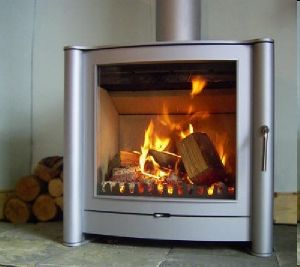Purchase Costs
The most obvious cost is buying the woodburner. Wood burning stoves are available to suit all budgets, but the cheapest woodburners are not the most efficient. Spending a little extra to buy a more efficient stove can be worthwhile to gain savings in fuel costs over time. Bargain hunters tend to buy woodburners on the internet in order to get the cheapest prices. It can take a little work to compare deals properly – make sure the price advertised includes VAT and delivery, and see if there are any special deals on chimney liner or free fitting accessories with the stove. To ensure you have full manufacturers warranty cover on the woodburner, check that you are buying from an authorised retailer. You may also need to buy a chimney liner or flue system and accessories such as a stove pipe or register plate. If you are not sure what you need, get expert advice before you buy.
Installation Costs
Installation costs vary enormously depending what work needs to be done. If you need a flue liner for your chimney or to fit a twinwall flue system because you don’t have a conventional chimney, this will increase your installation costs. Sometimes fireplaces need to be altered for a woodburner to be installed, at an extra and sometimes unexpected cost. It is a good idea to have a stove installation survey from a before you buy a woodburner – this will give you a clear idea of what work is necessary and the associated costs, as well as giving you an opportunity to get expert advice about what woodburner is most suitable for your requirements.
Running Costs
 Research prices for firewood or coal both from local and nationwide suppliers, unless you are lucky enough to have a free source of firewood such as a friendly tree surgeon! To get the best prices on firewood or coal you need to buy in quantity – if you don’t already have a suitable storage area factor this into your budget as well. Demand for woodburners is increasing in the UK, but the Forestry Commission is implementing a program to develop the UK wood fuel industry over the coming years to ensure plenty of quality firewood will be available at reasonable prices. Recommended woodburner maintenance includes having your chimney swept at least once a year and an annual service of the stove by a HETAS qualified engineer – it’s a good idea to allocate some of your budget to cover these expenses.
Research prices for firewood or coal both from local and nationwide suppliers, unless you are lucky enough to have a free source of firewood such as a friendly tree surgeon! To get the best prices on firewood or coal you need to buy in quantity – if you don’t already have a suitable storage area factor this into your budget as well. Demand for woodburners is increasing in the UK, but the Forestry Commission is implementing a program to develop the UK wood fuel industry over the coming years to ensure plenty of quality firewood will be available at reasonable prices. Recommended woodburner maintenance includes having your chimney swept at least once a year and an annual service of the stove by a HETAS qualified engineer – it’s a good idea to allocate some of your budget to cover these expenses.


No comments:
Post a Comment